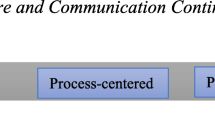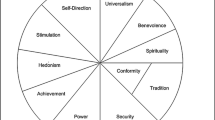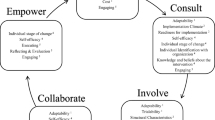Abstract
Purpose
Women with breast cancer require information about their cancer and its treatment during the process of treatment decision-making, yet it is unclear if there are barriers to information support. This study explores the experience of making treatment decisions in breast cancer, paying particular attention to the barriers experienced to the provision of information.
Methods
Using a grounded theory methodology, semi-structured interviews were conducted with 22 women with invasive breast cancer exploring the experience of treatment decision-making. Data was organized using ATLAS.ti software and analyzed using constant comparisons.
Results
Analysis of the data showed that barriers to cancer and treatment information include intrapersonal and interpersonal communication challenges (emotional distress, patient-provider communication, “making it personal,” access to information) which reside at different levels of the breast cancer experience (individual, dyad, group, organization). A model is provided to depict this experience.
Conclusions
Women want information about their cancer and its treatment and experience barriers to information provision at various levels. Satisfactory information provision cannot occur without addressing barriers at every level. Utilizing interprofessional models of care may minimize existing barriers to information provision and empower patients to make satisfying treatment decisions that are consistent with their individual wishes.

Similar content being viewed by others
References
Cox A, Jenkins V, Catt S et al (2006) Information needs and experiences: an audit of UK cancer patients. Eur J Oncol Nurs Off J Eur Oncol Nurs Soc 10:263–272. doi:10.1016/j.ejon.2005.10.007
Morrison V, Henderson BJ, Zinovieff F et al (2012) Common, important, and unmet needs of cancer outpatients. Eur J Oncol Nurs Off J Eur Oncol Nurs Soc 16:115–123. doi:10.1016/j.ejon.2011.04.004
Squiers L, Finney Rutten LJ, Treiman K et al (2005) Cancer patients’ information needs across the cancer care continuum: evidence from the cancer information service. J Health Commun 10(Suppl 1):15–34. doi:10.1080/10810730500263620
Matsuyama RK, Kuhn LA, Molisani A, Wilson-Genderson MC (2013) Cancer patients’ information needs the first nine months after diagnosis. Patient Educ Couns 90:96–102. doi:10.1016/j.pec.2012.09.009
Rutten LJF, Arora NK, Bakos AD et al (2005) Information needs and sources of information among cancer patients: a systematic review of research (1980–2003). Patient Educ Couns 57:250–261. doi:10.1016/j.pec.2004.06.006
Luker KA, Beaver K, Leinster SJ et al (1995) The information needs of women newly diagnosed with breast cancer. J Adv Nurs 22:134–141. doi:10.1046/j.1365-2648.1995.22010134.x
Husson O, Mols F, van de Poll-Franse LV (2010) The relation between information provision and health-related quality of life, anxiety and depression among cancer survivors: a systematic review. Ann Oncol mdq413. doi:10.1093/annonc/mdq413
Mistry A, Wilson S, Priestman T et al (2010) How do the information needs of cancer patients differ at different stages of the cancer journey? A cross-sectional survey. JRSM Short Rep. doi:10.1258/shorts.2010.010032
Ankem K (2006) Factors influencing information needs among cancer patients: a meta-analysis. Libr Inf Sci Res 28:7–23. doi:10.1016/j.lisr.2005.11.003
Arora NK, Johnson P, Gustafson DH et al (2002) Barriers to information access, perceived health competence, and psychosocial health outcomes: test of a mediation model in a breast cancer sample. Patient Educ Couns 47:37–46
Jefford M, Tattersall MHN (2002) Informing and involving cancer patients in their own care. Lancet Oncol 3:629–637
Reynolds PM, Sanson-Fisher RW, Poole AD et al (1981) Cancer and communication: information-giving in an oncology clinic. Br Med J Clin Res Ed 282:1449–1451
Güleser GN, Taşci S, Kaplan B (2012) The experience of symptoms and information needs of cancer patients undergoing radiotherapy. J Cancer Educ 27:46–53. doi:10.1007/s13187-011-0254-7
Hack TF, Degner LF, Dyck DG (1994) Relationship between preferences for decisional control and illness information among women with breast cancer: a quantitative and qualitative analysis. Soc Sci Med 1982 39:279–289
Jacobs-Lawson JM, Schumacher MM, Hughes T, Arnold S (2009) The relationship between lung cancer patients’ educational level and evaluation of their treatment information needs. J Cancer Educ 24:346–350. doi:10.1080/08858190902876601
Charmaz K (2006) Constructing grounded theory: a practical guide through qualitative analysis. Sage Publications, London
Charmaz K (2014) Constructing grounded theory, 2nd edn. SAGE Publications Ltd., Thousand Oaks
Epping-Jordan JE, Compas BE, Osowiecki DM et al (1999) Psychological adjustment in breast cancer: processes of emotional distress. Health Psychol 18:315–326. doi:10.1037/0278-6133.18.4.315
Zabora J, BrintzenhofeSzoc K, Curbow B et al (2001) The prevalence of psychological distress by cancer site. Psychooncology 10:19–28. doi:10.1002/1099-1611(200101/02)10:1<19::AID-PON501>3.0.CO;2-6
Erblich J, Montgomery GH, Valdimarsdottir HB et al (2003) Biased cognitive processing of cancer-related information among women with family histories of breast cancer: evidence from a cancer stroop task. Health Psychol 22:235–244
Pullens MJJ, De Vries J, Roukema JA (2010) Subjective cognitive dysfunction in breast cancer patients: a systematic review. Psychooncology 19:1127–1138. doi:10.1002/pon.1673
Ahles TA, Saykin AJ, McDonald BC et al (2008) Cognitive function in breast cancer patients prior to adjuvant treatment. Breast Cancer Res Treat 110:143–152. doi:10.1007/s10549-007-9686-5
Servaes P, Verhagen CAHHVM, Bleijenberg G (2002) Relations between fatigue, neuropsychological functioning, and physical activity after treatment for breast carcinoma: daily self-report and objective behavior. Cancer 95:2017–2026. doi:10.1002/cncr.10891
Adler NE, Page AE (2008) Cancer care for the whole patient: meeting psychosocial health needs. National Academies Press, Washington, DC
Fagerlin A, Zikmund-Fisher BJ, Ubel PA (2011) Helping patients decide: ten steps to better risk communication. J Natl Cancer Inst 103:1436–1443. doi:10.1093/jnci/djr318
Thorne S, Oliffe JL, Stajduhar KI et al (2013) Poor communication in cancer care: patient perspectives on what it is and what to do about it. Cancer Nurs 36:445–453. doi:10.1097/NCC.0b013e31827eeda4
D’haese S, Vinh-Hung V, Bijdekerke P et al (2000) The effect of timing of the provision of information on anxiety and satisfaction of cancer patients receiving radiotherapy. J Cancer Educ 15:223–227. doi:10.1080/08858190009528702
Knaus WA, Draper EA, Wagner DP, Zimmerman JE (1986) An evaluation of outcome from intensive care in major medical centers. Ann Intern Med 104:410–418
Young GJ, Charns MP, Desai K et al (1998) Patterns of coordination and clinical outcomes: a study of surgical services. Health Serv Res 33:1211–1236
Flocke SA, Stange KC, Zyzanski SJ (1998) The association of attributes of primary care with the delivery of clinical preventive services. Med Care 36:AS21–AS30
Safran DG, Taira DA, Rogers WH et al (1998) Linking primary care performance to outcomes of care. J Fam Pract 47:213–220
Dunn J, Steginga SK (2000) Young women’s experience of breast cancer: defining young and identifying concerns. Psychooncology 9:137–146. doi:10.1002/(SICI)1099-1611(200003/04)9:2<137::AID-PON442>3.0.CO;2-0
Schofield P, Carey M, Love A et al (2006) “Would you like to talk about your future treatment options?” discussing the transition from curative cancer treatment to palliative care. Palliat Med 20:397–406. doi:10.1191/0269216306pm1156oa
Butow PN, Maclean M, Dunn SM et al (1997) The dynamics of change: cancer patients’ preferences for information, involvement and support. Ann Oncol 8:857–863
Bombard Y, Rozmovits L, Trudeau M et al (2014) Access to personalized medicine: factors influencing the use and value of gene expression profiling in breast cancer treatment. Curr Oncol 21:e426–e433. doi:10.3747/co.21.1782
Avis NE, Crawford S, Manuel J (2004) Psychosocial problems among younger women with breast cancer. Psychooncology 13:295–308. doi:10.1002/pon.744
Peate M, Meiser B, Friedlander M et al (2011) It’s now or never: fertility-related knowledge, decision-making preferences, and treatment intentions in young women with breast cancer—an Australian fertility decision aid collaborative group study. J Clin Oncol Off J Am Soc Clin Oncol 29:1670–1677. doi:10.1200/JCO.2010.31.2462
Quinn GP, Vadaparampil ST, King L et al (2009) Impact of physicians’ personal discomfort and patient prognosis on discussion of fertility preservation with young cancer patients. Patient Educ Couns 77:338–343. doi:10.1016/j.pec.2009.09.007
Burton G, Dimbleby R (2006) Between ourselves: an introduction to interpersonal communication, 3rd edn. Bloomsbury Academic, London
Bultz BD, Carlson LE (2005) Emotional distress: the sixth vital sign in cancer care. J Clin Oncol 23:6440–6441. doi:10.1200/JCO.2005.02.3259
Holland JC, Bultz BD (2007) The NCCN guideline for distress management: a case for making distress the sixth vital sign. J Natl Compr Cancer Netw 5:3–7
Bultz BD, Groff SL, Fitch M et al (2011) Implementing screening for distress, the 6th vital sign: a Canadian strategy for changing practice. Psychooncology 20:463–469. doi:10.1002/pon.1932
Uitterhoeve RJ, Bensing JM, Grol RP et al (2010) The effect of communication skills training on patient outcomes in cancer care: a systematic review of the literature. Eur J Cancer Care (Engl) 19:442–457. doi:10.1111/j.1365-2354.2009.01082.x
Gysels M, Richardson A, Higginson IJ (2004) Communication training for health professionals who care for patients with cancer: a systematic review of effectiveness. Support Care Cancer 12:692–700. doi:10.1007/s00520-004-0666-6
Haidet P, Fecile ML, West HF, Teal CR (2009) Reconsidering the team concept: educational implications for patient-centered cancer care. Patient Educ Couns 77:450–455. doi:10.1016/j.pec.2009.09.020
Author information
Authors and Affiliations
Corresponding author
Ethics declarations
Conflict of interest
The authors declare that they have no conflict of interest.
Rights and permissions
About this article
Cite this article
Campbell-Enns, H.J., Woodgate, R.L. & Chochinov, H.M. Barriers to information provision regarding breast cancer and its treatment. Support Care Cancer 25, 3209–3216 (2017). https://doi.org/10.1007/s00520-017-3730-8
Received:
Accepted:
Published:
Issue Date:
DOI: https://doi.org/10.1007/s00520-017-3730-8




